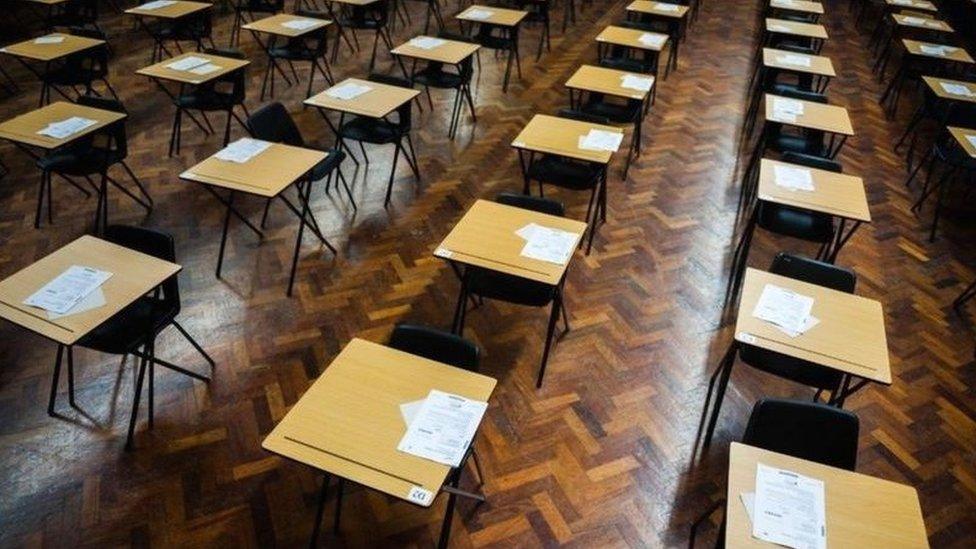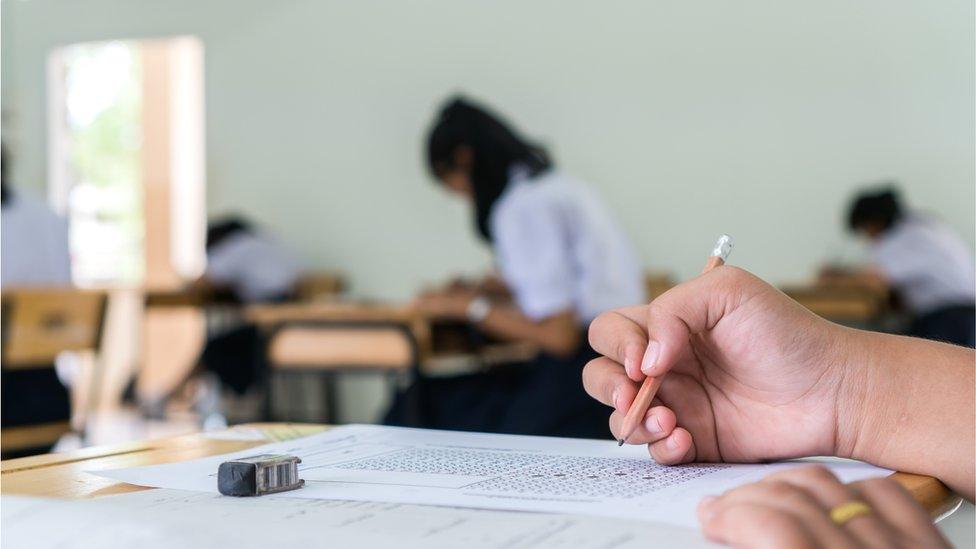Covid: How might GCSE and A-levels work this summer?
- Published

A-levels and GCSEs in England are due to go ahead next summer, with the exam season starting three weeks later than usual.
Plans for how to manage them in a pandemic are expected to be published later this week.
So what are the options for making exams fair when many teenagers have missed out on schooling due to the Covid-19 pandemic?
Socially distanced exams
Socially distanced exams have already had a trial run with GCSE resits in further education colleges in England in November.
It was a big task, with colleges emptying out their buildings so they had enough space to set out for the exams.
While tens of thousands of students were resitting maths and English exams, the summer exams are taken by hundreds of thousands.
But the autumn retakes have shown that exams can happen in difficult circumstances, albeit on a much smaller scale.
By early summer it's also possible that rapid testing, of the kind being used at universities, could be targeted at any remaining areas of high transmission.
More generous grades than normal
This is expected to happen.
In summer 2020, grades based largely on teacher assessment jumped up - 78.8% of GCSEs were grade 4 or above compared to 69.9% in 2019.
Top grades in A-levels went up too.
So will it be back down with a bump this year with exams? That would cause an outcry, because all students have missed out to different degrees.
The exams regulator Ofqual has already said the "baleful" impact of the pandemic on some students means it doesn't want to drive grades back down to pre-pandemic levels.
Advance warning of topics
Giving schools some advance warning of which topics are coming up is already in place for some subjects - and that could increase.
Advance warning could be given of the main topics for exams, so schools can use the time between now and the exams to best prepare students.
There are different ways this could be done, from identifying texts to slightly narrowing down the content.
The scope of the exams has already been reduced in GCSE English literature, history and ancient history.
For example, a pupil would have to answer on a Shakespeare play and then two out of three optional areas in English literature papers.
The difficulty of extending this is it risks further increasing the advantage for teenagers who have faced little disruption due to Covid-19 since September.
But it would help schools focus their efforts over the next few months.
More choice of individual questions
This is one of the suggestions backed by the Labour Party and has gained interest from some head teachers.
But it's an idea that's been sliding down the popularity scale.
It would mean putting more choice of questions on exam papers, so students could answer on what their school had managed to cover.

It's a form of optionality.
However, research has suggested that it can make exam papers more confusing to navigate, which ends up favouring the academically stronger pupils.
Recognition some have missed more than others
This is the biggest headache - hard to fix fairly and potentially politically tricky too.
Secondary school attendance has fallen dramatically to below 70% of pupils in some areas.
Parts of North West England have been badly affected, and some schools in Kent are feeling the impact now.
The Labour Party has called for regional adjustment of exam results.
That wouldn't take account of highly localised differences, with some schools - even within the same areas - being differently affected, and for that reason it is unlikely.
But there will be pressure to find a way of recognising the lost learning.
This is unlikely to be done officially, which could risk leaving students carrying a qualification into their future that marks them out as different.
Schools are likely to help students plead special circumstances so they can progress to college, apprenticeships or university.
Already two universities have said they will accept one grade lower in recognition of the disruption this year.
Grades for students who miss exams
There could be more than one solution to the issue of students missing exams.
Every year some students miss exams because of illness, accidents or a family tragedy.
There is a process to deal with these "special considerations" which could be used for individual students.
It can involve using data from another paper in the same subject and teacher assessment.
But what if a bigger group of teenagers miss out on crucial exams?
A contingency series of exams at a slightly later date is likely, so that anyone who needs to go on to the next stage isn't held up waiting for autumn.
What's happening elsewhere in the UK?
A-levels and GCSE exams in Wales have already been cancelled.
Nationals in Scotland have also been cancelled, but Highers and Advanced Highers will be taken, two weeks later than usual.
In Northern Ireland, GCSEs and A-levels will go ahead, but will start a week later than usual.